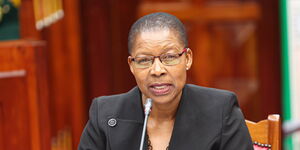The government has quietly raised the national debt ceiling by Ksh1 trillion, to hit Ksh10 trillion.
The National Treasury Cabinet Secretary, Ukur Yatani, raised the ceiling by exploiting provisions of the Public Finance Management (National Government) (Amendment) Regulations, 2022.
In a Special Gazette notice dated Thursday, May 26, Yattani increased the country's debt limit to help finance the budget deficit of over Ksh400 billion.
This action by Yatani followed the amendment of Regulation 26 of the Public Finance Management Regulations Act (2015).
"Regulation 26 of the Public Finance Management (National Government) Regulations 2015, is amended in sub-regulation 1 by deleting paragraph (c) and substituting therefore with: pursuant to the provision of section 50(2) of the Act, the public debt shall not exceed Ksh10 trillion," the notice read in part.
The proposed regulations by Yatani will be subjected to debate in the National Assembly when parliamentarians sit to debate the contents of the whole proposal.
Speaking to Kenyans.co.ke, finance expert and Somakazi Chief Executive Officer (CEO), Nicholas Gachara, opined that the ceiling raise will have both positive and negative in the country's finances.
Gachara explained that if the new debt ceiling will be used to secure loans which will be directed toward development projects, then there was no cause for alarm since most Kenyans will be the ultimate beneficiaries.
He noted that such development projects will benefit Kenyans through creation of jobs. He, however, argued that taking loans to meet recurrent expenditure will be detrimental to the country in the long run.
"Debt is double-edged, if it is going to be used for development then that would be a good debt. If it will be used to meet recurrent expenditures like civil servants' salaries, then it becomes a bad debt. Recurrent expenditure should be met by the revenue collected internally through taxes," he stated.
The Somakazi CEO pointed out that the long term effect of increasing the debt ceiling will increase the cost of living. He expounded that in offsetting debt, the government may resort to increasing taxes in a bid to generate more revenue through a widened tax base.
He opined that should the state take more dollar loans, it may struggle to pay up owing to the dollar shortage and fluctuating and parallel exchange rates. This, he says, may force the government to pay higher interest rates.
"I am worried because going forward, Kenya may find it difficult to pay the international debt especially if we are going to go for dollar-denominated loans.
"Parallel rates, where entities it borrows from may have a higher exchange rate than what the country offers, may put pressure on the state. It will also increase the cost of living because we import the majority of items in foreign currency rates," he stated.
Gachara added stretching the borrowing limit will further raise the country's debt to Gross Domestic Product (GDP) ratio from the current 68.1 per cent. This, he stated, threatens the country's borrowing limit.
"The current debt to GDP ratio is approaching 70 per cent because the Kenyan economy is valued between Ksh13 to 14 trillion and they want to increase the debt to Ksh10 trillion, which would push it closer to 100 per cent," he added.












